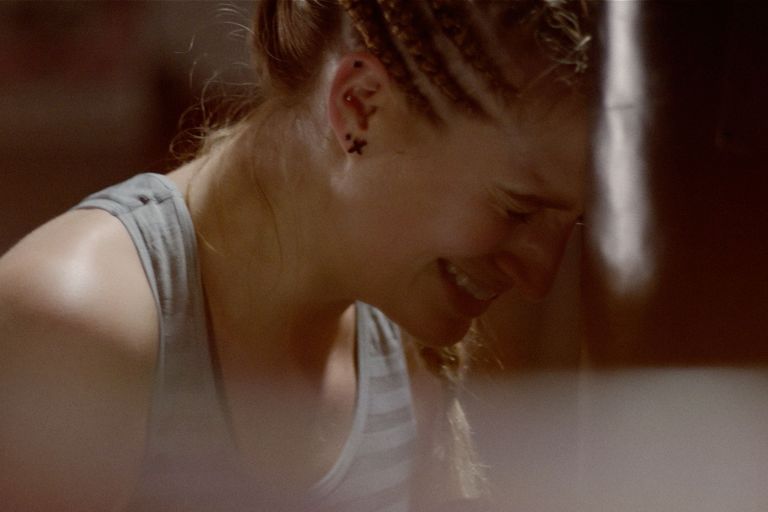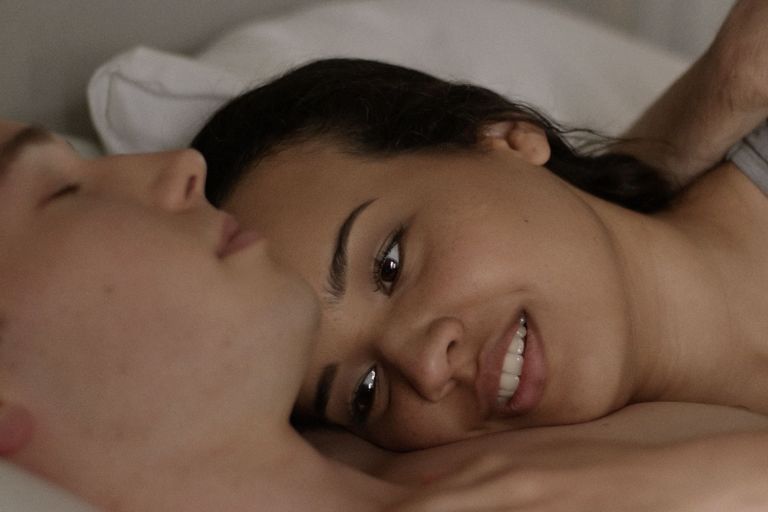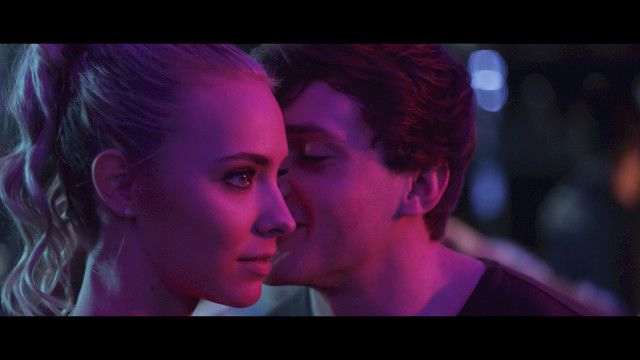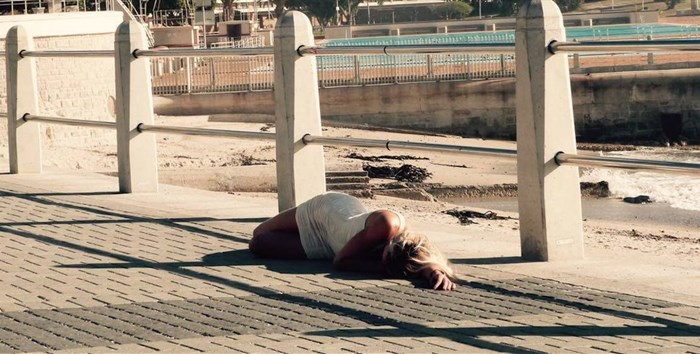Kevin and Mike are young men trying to get ahead in the competitive world of tennis. When one of them discovers a dangerous key that can unlock their potential, things get out of hand. Their worlds become intertwined and spiral out of control. A small series of seemingly insignificant moments weave together with devastating consequences. In every moment lies a choice. The frightening truth is that we all can turn from ‘us’ to ‘them’. The trick, the prayer, the hope is that we won’t.
Cut-Out Girls is inspired by the #MeToo movement and is a film about date rape aimed at creating social change.
Nicola Hanekom studied drama at the University of Cape Town and City Varsity. She has been a freelance actress, director and writer for the past 20 years.
Her theatre work as writer/director includes a series of site-specific productions: Betésda, Lot, Babbel, and Land van Skedels. As a writer and performer, Hanekom created ‘Trippie’, and her self-penned ‘one-woman’ show Hol/Running on Empty. These together with her latest play, In glas, have garnered 12 Kanna awards, 11 Fiësta awards, two ATKV writing awards and one Aartvark award.
Hanekom was also awarded the Eugene Marais prize for her collection of plays, Die pad byster. She has written and directed two short films, ‘Trippie’ and ‘Unspoken’. Her short, ‘Trippie’, won two Silwerskermfees awards.
Cut-Out Girls is her first feature film. Daniel Dercksen chats to her to find out more.
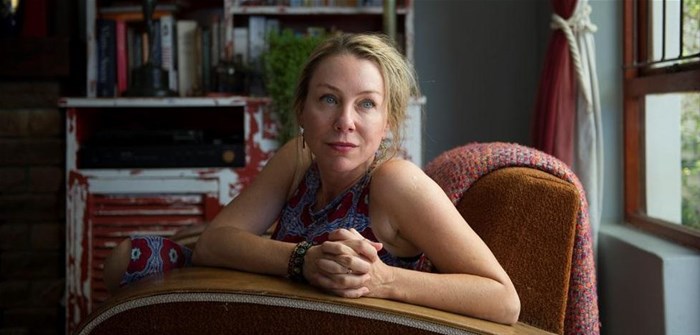
Nicola Hanekom
What inspired your stage play Cut Out Girls?
Cut-Out Girls was written after I read in my local newspaper about women getting drugged in a club not too far from my house. I live in Blouberg. It felt unnerving that this was going on right here.
The article in the newspaper was basically a warning. I was intrigued by how men think that the line is blurred when a woman is drunk or drugged. That the drugged woman’s inability to put up a struggle is in a twisted way taken as consent.
What were men thinking when doing this and why? I still don’t know if I found the answers.
Tell me about the title?
Yes, it is a bit obscure, isn’t it? I went through the Oxford dictionary twice trying to find something more mainstream, but couldn’t so Cut-Out Girls it is.
In my mind I see #MetToo and all the other women’s movements like those cut-outs you make out of paper, where the girls are joined, holding hands. You get this long string. It is fragile because it is of paper and it only works because the hands are linked.
So, it is about sisterhood, about support, about standing up to GBV together. Some people say they think it is about how the guys in the film view the women, as if they are cut-outs, not human beings. What I also like about the title is that if you hear it, as opposed to reading it.
You miss the hyphen. You think of something being cut out. I also use ‘girls’ instead of women because for me, when a woman gets raped their innocence, their inner child is lost. Something deep inside them is cut out forever and they can’t get it back.
How much does the film adaptation change?
Massively. The original characters are all still there and some of the plot twists but it is an entirely different medium. The biggest difference from play to screenplay is less dialogue more pictures.
Was it difficult to adapt your own play to film? What were the obstacles?
It was tricky but fun. My biggest obstacle always is probably my own fear. I have made a couple of short films but this was my first feature and because it is a multi-character narrative, it is even harder.
If you write for one hero, it is easy to make the audience like her. If you write for several heroes the audience spends less time with each character, so you have less time to create depth and empathy per character.
Then you still have to weave the whole thing together. I am also a realist and knew it would be tough to get the money so had to write with budget in mind.
Tell me about the process from play to the big screen, was it a difficult one?
I probably covered this a bit in my previous answer. I think Stephen Fry explained it best. He said something to the effect that a good lead in a play is Hamlet and in a film, Lassi. In plays it is about thoughts told in words, in movies it is about plot told in pictures.
Tell me about developing the play using a cast of young actors that you and producer Grant Swanby coached at Act Cape Town Film Acting Academy in Cape Town.
ACT specialises in film acting. I really believe that it gives actors excellent training. Our curriculum is ever-evolving because a coach would literally bring what they know straight from the set because all the coaches that teach there are professional actors in their own right.
It was so awesome working with actors that I helped train. This was an amazingly-talented and passionate group of actors. They gave me a lot of their time so we could do thorough rehearsals, something almost unheard of in local films.
I had also been coaching them for over two years so knew each individual very well and they knew me. I wrote them characters that would showcase their skills as actors.
Also, because we had done the play, the characters weren’t only skin deep. They were rooted and truthful. The film is quite dark so it required us all to be brave and trust one another.
It was this special bond that was created with these actors, coupled with the visceral response to the play, that prompted you to develop the script into a full-length feature film. Tell me about this?
It became clear through the audience response that there we’re individuals watching in almost every show that had been affected by assault or rape. The play somehow opened a space for them to talk about it.
Many people reached out to me over social media with their stories. It is alarming to realise the extent of the problem. Recently we all saw just how strongly people feel during the marches countrywide. We need to change.
That is why we are using #InEveryMomentLiesAChoice for our film. We want to help turn this thing around. We can choose to be different. We don’t have to be a nation that rapes.
There is a bright future for independent filmmaking in South Africa, Cut-Out Girls was a true labour of love, funded in part by an Indiegogo crowdfunding campaign. The crew consisted mostly of young film graduates, with talented cinematographer Brett Rayner brought in to add his dynamic vision to the project. Do you think the challenges of ‘doing it yourself’ stimulates the creative process?
I’m so used to being practical and hands-on from working in the theatre. I’m used to creating within my means if you can put it that way. I do have many other films and television series brewing in my head and some already written that will require proper funding though. I would love proper funding, who wouldn’t? One thing stays true about all my work though – respect for acting, for truthful storytelling. If your film doesn’t have a heart, it won’t move audiences, no matter how high your production value.
You mentioned that as an artist you are conscious of what I put out into the universe. Tell me more about this?
The world we live in is flooded with so much stuff. It is a busy and cluttered place. It is noisy here. So if I’m going to say something, it better be useful, there better be beauty and hope in it.
Do you think that being a playwright and actress is beneficial to writing a screenplay? How did it help you?
Absolutely! Maybe I’m going to be a jack of all trades master of none. I don’t know, but to me, it feels that it all feeds superbly into one another.
I act, write, direct and coach. When I direct, I know what it feels like to receive direction. I really understand how exposed and vulnerable you can feel as an actor, how brave you must be because I’ve been there.
When I write, I read what I’ve written out loud. I can immediately feel if it won’t sit right in someone’s mouth. Of course, I do still feel a bit like an actress being an impostor because I wasn’t trained to direct or write.
I didn’t go to film school, but this is my life. I just want to do it all. I am so happy when I’m making something. When on set, it feels like I belong.
Any advice for aspiring writers who would like to write for film or theatre?
Don’t be an ‘all talk no action’ somebody. Sit on your bottom and write. Nothing writes itself. Don’t worry if it is not perfect. Nothing ever is. Don’t worry if it is bad. Writing isn’t brain surgery.
No one is going to die if your script isn’t good. The only risk is that your ego might get bruised. So what? Do it. First, there is nothing. And then after you’ve written, there is something. Isn’t that extraordinary?
Don’t listen to the critics. When people tear you down it is often because they don’t have the balls to try to make anything. They don’t know how hard it is. Don’t delay. Don’t make excuses, go sit down and write.
What do you hope audiences will get out of watching Cut-Out Girls?
I’m hoping they will be moved. I’m hoping they will think long and hard. I’m hoping it brings healing. And I’m hoping that the one guy or more who sees it, that might have been tempted to rape in the future, now won’t.
Any future projects?
Several that I don’t have funding for – yet. (Trying to be positive.) I’m also very pleased that I’m making a play for KKNK next year. I’m back with a site-specific piece called Mirre en Aalwyn.
Then I was also fortunate enough to have a small part in a film called Pou. That will come out next year by this awesome director called Jaco Minnaar.
Cut-Out Girls releases in SA cinemas 22 November 2019.
































